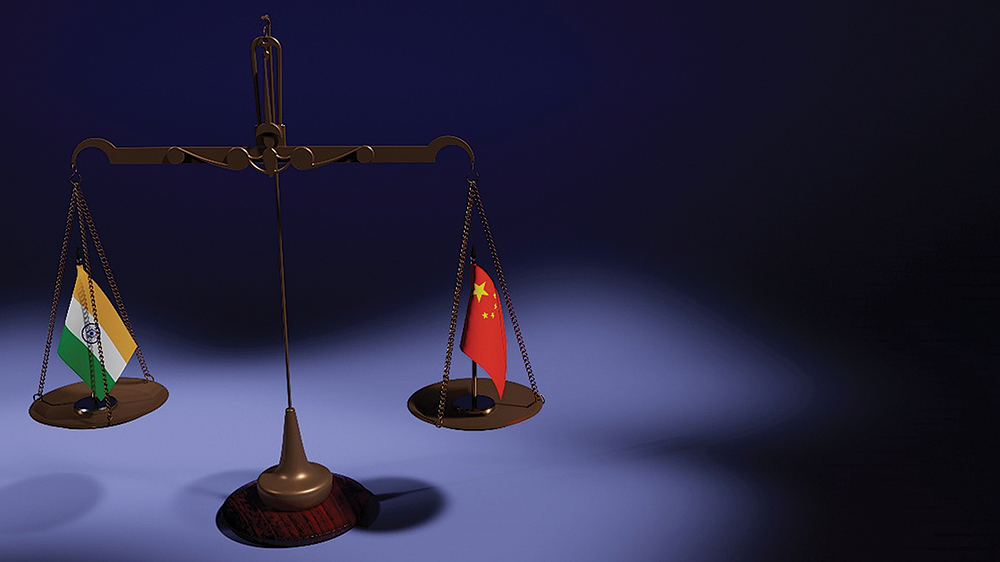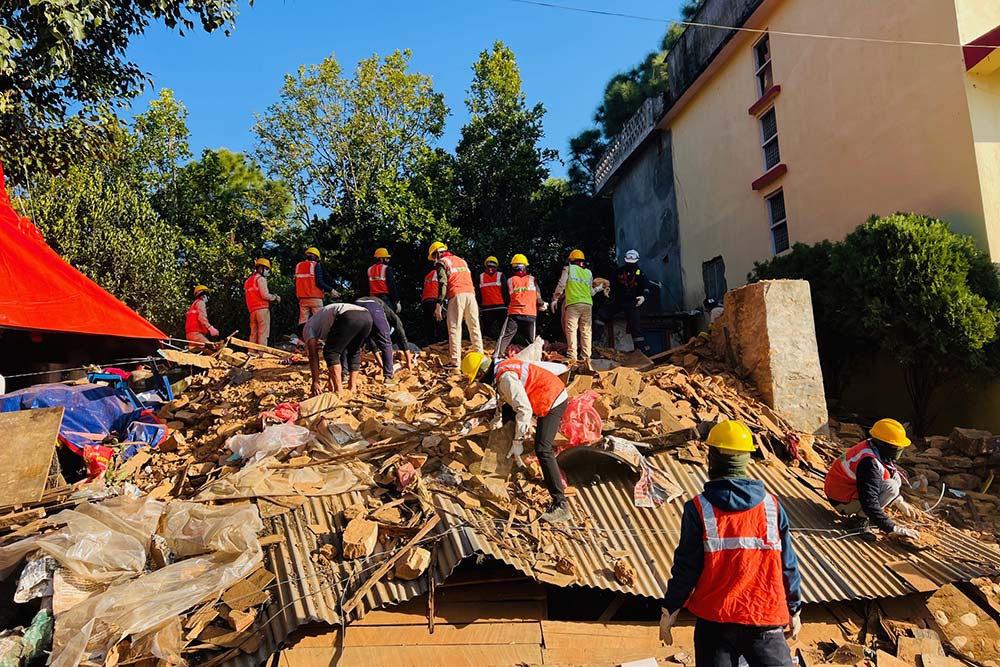
The economic centre of gravity has been currently moving towards Asia from the West and carries the prospect for Asian countries to grow and prosper immensely. Research conducted by Danny Quah, Professor of Economics at the Lee Kuan Yew School of Public Policy, National University of Singapore, on the economic centre of gravity states that the centre will be Nepal by 2050. A study carried out by the Asian Development Bank (ADB) found that three billion Asians (56.6% of the estimated 5.3 billion total inhabitants of Asia by 2050) could enjoy living standards like those in Europe by then, and the region could account for over half of global output by the middle of the 21st century. Most importantly, the 21st century is projected to be the Asian Century which is parallel to the characterisation of the 19th century as Britain’s Imperial Century, and the 20th century as the American Century. Nepal can offer services to half of the world through five-hour flights including Beijing, Seoul, Moscow, Jakarta, Bali, Hong Kong and other cities. Aggressive investment is being done in infrastructure particularly in the sector of connectivity in both neighbouring giants, China and India, like the Belt and Road Initiative (BRI) and Bharatmala to shorten the distance with large international markets. To reap the benefit from the aforesaid projects, Nepal must have amicable foreign relations governed by a rational foreign policy and conscious national security strategy, according to Rupak Sapkota, PhD from Renmin University of China and Former Deputy Executive Director of the Institute of Foreign Affairs (IFA).
However, lack of maturity and clarity on shifting global power could be further weakened by the petty political interests of national political parties turning Nepal into a playground for powerful nations and emerging neighbouring giants to exploit and weaken. “Along with the shift in global power, the rivalry between rising and falling powers has increased intensively,” said Sapkota. The government that is going to be formed after recent elections with a fresh mandate from the people will have to settle pending issues and maintain a delicate balance. The foremost challenge in relation with India is recruitment of Nepali youths in the Indian Army under the ‘Agnipath’ scheme. Sewa Lamsal, Spokesperson for the Ministry of Foreign Affairs, has said that the government has kept the proposal of the Government of India on hold due to the general elections and the new government will now have to deal with this proposal. Under the Agnipath scheme, among all those who have been recruited only a select few will get a chance to serve for the long term in the military. According to the Indian government, 46,000 Agniveers will be recruited annually – 40,000 for the Army and 3,000 each for the Navy and Air Force. They will receive military training and learn leadership and other skills.
Other than the monthly compensation and other benefits like insurance, the Agniveers will also receive a retirement package after four years for those who are not selected for the long term. Discontinuation from the job after four years except for those who are selected for the long term might pose a threat to Nepal as youths with military skills could be exploited negatively. Also, the entry of Nepalis into the military of other countries has been considered against the principle of Nepal’s non-aligned foreign policy. Experts say that the Nepali government must deal with this issue with rationale. Tens of thousands of Gorkhas are serving in the Indian military currently. Prior to the Covid 19 pandemic when the Agnipath scheme was not introduced, the Indian government used to recruit 1,400 soldiers into the Gorkha regiment annually. One must now also take into consideration the border dispute that Nepal has with India, triggered by political parties and yet without any serious dialogue with India regarding settlement of the border issues. The new government will have to initiate dialogue with India regarding the border issues and the revision of unequal treaties and agreements even as it develops a cordial relation and fosters new dimensions of socio-economic partnerships including power trade with India. Biswas Gauchan, Executive Director of the Institute for Integrated Development Studies (IIDS), said that Nepal has to reshape economic relations with India as it has been facing an alarming trade deficit with the southern neighbour and there is also a huge outflow of remittances from Nepal to India. He said that the ‘risk of twin deficit’ – trade deficit and deficit of remittance inflow compared to outflow – poses serious threats to the macroeconomic stability of Nepal. Nepal falls under the top 10 remittance contributors of India and Nepal is the second country with whom India has been enjoying trade surplus after the United States of America. However, these strengths of Nepal are hardly taken into account during bilateral negotiations. “India should be flexible and open-hearted towards Nepal’s socio-economic development,” Gauchan told Business 360. The rivalry between China and the United States of America might impact Nepal in a big way as we have witnessed that tensions were reflected with Tibetan refugees and the US grant aid cooperation to Nepal through Millennium Challenge Cooperation (MCC) and China’s subsequent displeasure. The US has been creating a strong presence in Nepal. Apart from $500 million grant through MCC for electricity transmission project and road maintenance for the next five years, the regular assistance for Nepal through USAID has also increased significantly.
According to International Economic Cooperation Coordination Division (IECCD) under the Ministry of Finance, USAID has approved $659 million for the next five years. “Such an amount of aid and other technical assistance for capacity enhancement have never been granted by our neighbouring countries despite them emerging as major economies in the global arena,” reflected Former Minister, Devendra Raj Pandey. “Nepal must maintain good relations with the United States and recognise their contribution to human development, our values, human rights, among others,” he added. However, Nepal should be careful regarding the issue of Tibetan refugees while hobnobbing with the United States, according to Sapkota. The high-level visits from the United States in recent times and the visit of Uzra Zeya, Under Secretary of State for Civilian Security in the Joe Biden administration to the Tibetan camps in Kathmandu and Lalitpur in May this year antagonised China. It somehow demonstrated that Nepal had derailed from its commitment of One China Policy, which is the major mantra for maintaining amicable relations with China. Nepal is home to around 13,000 Tibetan refugees and the United States has been showing an interest in refugees. They have been urging the Government of Nepal to issue the refugees with identity cards to ease travel, higher studies, business trips and ensure freedom for their activities in Nepal. “Respecting the basic human rights of the refugees is necessary but the government must not allow them the freedom to conduct anti-China activities, else it could be dangerous for Nepal,” opined Sapkota. “Nepal’s geopolitical location carries both opportunities and challenges, however, we must look into the interest of our immediate neighbours too,” he mentioned. Stating that Nepal is disaster prone and is vulnerable to potential calamities due to climate change and other factors, Sapkota recalled that India and China were the first to provide rescue assistance during the massive April 2015 earthquake.
In June this year, the government decided to stay away from the US State Partnership Programme (SPP) considering its amicable relation with China. The US had offered an additional grant assistance under this partnership which is basically designed to strengthen military cooperation. “However, the course of SPP has not concluded. The outgoing government had the comfort of not taking any concrete decision citing it wouldn’t be appropriate to make vital decisions by the outgoing government. The new government might have to deal with it and carry it forward to a conclusive end,” Sapkota said. In June 2022, Commander General Charles A Flynn, Commander of the United States Army Pacific Command (USARPAC) of the United States of America termed Nepal as ‘Land Power’ during his visit to Nepal which reflects Nepal’s strategic importance for the power nations, as per geopolitical analysts. Besides, the new government has to take forward some projects under Belt and Road Initiative. Despite being a member of China’s BRI in May 2017, Nepal has yet to take forward any development project under BRI which has been analysed as the Government of Nepal’s reluctance to deal with the BRI projects. It is reported that China has been repeatedly asking Nepal to submit the projects that it is willing to implement under BRI. Along with the rise of Xi Jinping as the President of China for the next stint, rivalry with the US might rise as Xi has also proposed a Global Security Initiative to counter the Indo-Pacific and QUAD (Quadrilateral Security Dialogue) led by the United States. “Though China has not asked Nepal to join the Global Security Initiative, however, a proposal might come from the northern neighbour,” Sapkota stated. “Nepal will have to handle its foreign relations tactfully in the coming days considering the geopolitical rivalry and shift in global power balance.” Nepal is keen to avail cooperation from China, particularly in infrastructure development.
For instance, the Trans Himalaya connectivity linking Nepal with the rail network of China has already been expanded to Shigatse of China and is being further expanded to Kyirong, the nearest town from the Nepal border. In addition, China has promised to upgrade Nepal’s status as an observer from the existing status of dialogue partner in the Shanghai Economic Cooperation to avail development assistance to fulfil Nepal’s development aspirations. Considering the pressing challenges caused by the geopolitical rivalry and shift in global power balance, Nepal needs to be more cautious and swiftly handle its foreign policy with diligence to avoid the interest of power nations and neighbours and stop them from colliding with each other while dealing with Nepal, say experts.
What do the political party manifestos say about international relations?
Sovereign equality and international role
Nepal cannot be considered an isolated country from the global market like in the 20th century due to the proximity with India and China, the two emerging economies of the 21st century, and also with nations in the Middle East. We have to establish Nepal as a destination for high-yield tourism and other services. Though we are small in terms of our geography with the neighbouring giants, however, we’ll take the country forward in sovereign ‘reciprocity’. Respecting the international border norms, Nepal shall emphasise on effective partnership and be confident about taking a leadership role to respond to climate change issues, pandemic, migration, transportation and energy infrastructure and economic policy coordination along with facilitating trade, tourism, foreign direct investment and value chain integration. Regarding the international ‘benchmark’, Nepal is set to graduate to the league of developing nations from ‘Least Developed Country’ (LDC) status by 2026.
In the next four to eight years, Nepali Congress will adopt pragmatic solutions for a smooth transition during the graduation process mainly for easy market access for Nepali products in the developed countries and subsidised development aid. As pledged to the United Nations General Assembly, Nepal has aimed to achieve 169 quantitative targets of the Sustainable Development Goals (SDGs). This is not only the responsibility of the government, in fact, this is a comprehensive national obligation. In this regard, the government shall inject 55% of the required resources and the rest shall be mobilised from the private sector, development partners, foreign direct investment and non-governmental organisations (NGOs). We are committed to clearing the roadblocks to attracting foreign investment by providing them with an assurance of needful security and protection. We believe in patriotic politics that support the public to enhance their living standards rather than pseudo nationalism (xenophobic) that doubts every foreign resource, contact and relation.
We would like to mobilise the capital, knowledge and skills of the quantitatively growing Nepali diaspora for mainstream national development. Nepali Congress is aware of the inspiration and commitment of the first-generation Nepali diaspora community to contribute to the prosperity of the country based on equality. Nepali Congress has played an instrumental role to incorporate the provision of Non-Resident Nepali citizenship in the Constitution of Nepal. Nepali Congress manifesto also incorporates the border dispute issue with both neighbours – China and India. It says, “Nepali Congress-led government will initiate decisive political and diplomatic dialogue for settling border disputes with both neighbours, India and China, to safeguard the country’s territorial integrity and sovereignty.”
Communist Party of Nepal (UML) 
Friendship with all, enmity with none
- Our foreign relations shall be guided by the UN charter, five principles of mutual respect for sovereignty and territorial integrity, mutual non-aggression, non-interference in each other’s internal affairs, equality and mutual benefit, and peaceful coexistence; mutual benefit, international commitment and obligations and based on justice. The policy of ‘Friendship with all, enmity with none’ shall be adopted.
- Sovereign equality shall be the major principle while acting on foreign relations. Independence and freedom shall be used in actual sense and spirit in foreign relations.
- Priority shall be given for relation with neighbours and develop international relation accordingly.
- We will always favour our national interest, dignity, prestige, world peace, humanity and preservation of the world while being presented at the UN and other regional and multilateral forums.
- Territorial integrity of Nepal, sovereignty, independence and freedom shall be further strengthened. Nepali territories Limpiyadhura, Lipulekh and Kalapani and rest of the border territories shall be protected in an equal manner.
- Treaties and agreements shall be revised to promote and preserve Nepal’s interests and new treaties and agreements shall be signed as per requirement. Experience, skill/expertise and capital of the diaspora community shall be mobilised with proper recognition and respect.
Communist Party of Nepal (Maoist Centre) 
National security and independence-focused foreign policy
- The foundation of our foreign policy will be in line with national interest, peace zone and non-aligned. - Strong national unity for nationality and independence It is said that geography determines international relations and foreign policy. Economy and politics measure the independence. Nepal has been consistently adopting non-aligned foreign policy since the Cold War between the United States and the Russian Federation in the past and unipolar dominating presence of the United States. In the present scenario, the global power gradually is shifting towards East Asia, particularly, in our neighbourhood – India and China. Specifically, the Cold War of this era is between China and the USA and anyone can feel the cloud of Cold War hanging over Nepal as the United States of America has been constantly trying to make India her ally and act in her favour. This is the biggest challenge for Nepal. In this changed landscape, the CPN (Maoist Centre) shall provision the following national security and foreign policy in the context of national security and protecting our national independence.
- National security policy shall be revised by ensuring respect towards the dignity of the country, preservation of natural resources, national independence, sovereignty and territorial integrity.
- Implement shared and autonomous governance in the context of federal governance and promote internal unity of the country to strengthen sovereignty of the country.
- To equip Nepal Army with required logistics, modernise it and make it more capable. Likewise, Nepal Police and Armed Police Force shall also be equipped with logistics and resources. They will also be modernised in the context of new technology, skills and knowledge to keep peace and security of common people and promote human rights.
- Nepal’s autonomy in making decisions, freedom and independence, territorial integrity and protection of sovereignty shall be given utmost priority while exercising foreign policy. Foreign policy shall be guided by world peace, five principles of mutual respect for sovereignty and territorial integrity, mutual non-aggression, non-interference in each other’s internal affairs, equality and mutual benefit, and peaceful coexistence; UN Charter and the national welfare and interest.
- Close ties with both neighbours shall be established considering the geopolitical status. Activities against both neighbours from the territory of Nepal shall be completely prevented.
- Nepal shall be established as a peace zone preventing any foreign military activities in the country. Nepal will not be a part of any bilateral or multilateral military alliance.
- We shall give emphasis to seek resolution of any international dispute and conflict on the basis of the UN Charter and prevailing international laws. Nepal firmly stands in favour of world peace. Nepal strongly opposes the expansion of military power, atomic power and competition on arms/ammunition tests and firmly stand for world peace and harmony.
- Encroached land of Nepal – Kalapani, Lipulekh and Limpiyadhura – shall be restored as Nepali territory through immediate diplomatic initiation.
- The trilateral treaty of 1947 on recruitment of Gurkhas (military), 1950’s Peace and Friendship Treaty with India, and other unequal treaties on water resources, trade and transit with India shall be scrapped, replaced or revised in a bid to make them favourable as per our national interest.
- Porous open border between Nepal and India shall be controlled and regulated.
- Considering our national interest of developing self-reliant and independent economy the quantity of conditional foreign aids, grants and loans shall be minimised gradually and foreign investment and loans shall be availed to develop infrastructure as per our national interest. Any foreign aid that is adverse towards our national interest and sovereignty will not be accepted.
- Keeping five principles of mutual respect for sovereignty and territorial integrity, mutual non-aggression, non-interference in each other’s internal affairs, equality and mutual benefit, and peaceful coexistence alive, Nepal shall constantly retain its non-aligned posture in the international arena and also deliver our strong presence in bilateral, regional and multilateral forums considering the changes in the regional and global order (power balance).
- Nepal’s diplomatic missions abroad, government agencies serving in areas of foreign affairs and diplomatic relations shall be developed as more relative to the present scenario.
- Soft power and digital diplomacy and other various ways shall be exercised to run public diplomacy in the 21st century and strengthen public diplomacy to strengthen our national interests.
- Initiative shall be taken to address issues of equal facilities and wages for similar nature of work as demanded by the Gurkha soldiers.
Balanced foreign policy fundamental for running the government
Rastriya Swatantra Party has made a commitment to be consistent with equidistant foreign policy with each country.
- Global coordination shall be prioritised for climate change, knowledge and technology transfer.
- All grant assistance (conditional and unconditional) and agreements shall be presented among the citizens in a transparent manner. In addition, it has also stated it will mandatorily have discussions with all parties regarding foreign grants and proposals considering whether the final/ultimate responsibility of the proposer rests on a regulating agency or not.
- With due respect to the importance of neighbouring countries, we shall initiate peaceful ways for settling border disputes and take forward economic cooperation.
- With the wide publicity of Nepal’s unique geography and establishing Nepal as a peace zone, we shall take an initiative to establish the headq uarters of the UN agencies and multilateral development banks in Nepal.
- Take a lead role in SAARC, BIMSTEC, BBIN and other regional forums.
READ ALSO:








